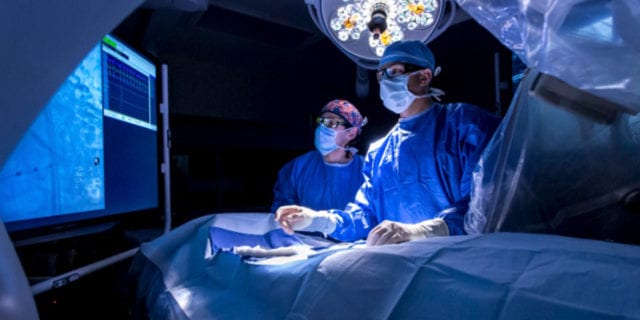Jersey Shore University Medical Center Cardiac Team Performs Rare Simultaneous TAVR, TMVR and Alcohol Septal Ablation Procedures
Expertise, teamwork and technology enables physicians to continually innovate and advance cardiac care with New Jersey’s first double transcatheter valve and ablation procedure

Experts from Hackensack Meridian Jersey Shore University Medical Center’s Structural Heart Disease Program recently performed, to the program’s knowledge, New Jersey’s first transcatheter double heart valve replacement, combined with alcohol septal ablation. The three treatments were completed together during one visit to the academic medical center’s advanced hybrid operating room, to ensure the patient’s safety.
Simultaneous Conditions Required Minimally Invasive, Combined Approach
After dealing with cardiac issues for several years. cardiothoracic surgeon Kourosh Asgarian, D.O., performed coronary artery bypass graft surgery (CABG) to correct blocked arteries in 2017 and since that time, she has been under the care of her cardiologist Steven Daniels, M.D.
Over the past year, Dr. Daniels became very concerned for the patient, as two of her valves deteriorated and heart functions weakened, forcing her to frequently seek care for congestive heart failure. He consulted with Jersey Shore University Medical Center’s Structural Heart Disease Program Director Matthew Saybolt, M.D., FACC, and Dr. Asgarian to discuss potential treatment options. The two physicians then performed the combined corrective procedures.
The patient was struggling simultaneously with severe aortic stenosis and severe mitral valve stenosis, or narrowing of the heart valve openings, heart failure, pulmonary hypertension, and substantial calcification of the heart valves.
Expertise When Limited Options Exist
“Since the patient could not safely undergo open heart surgery for a second time, and was suffering with these conditions, we decided it was best to avoid completing multiple procedures at separate times, that would strain the patient’s heart,” said Dr. Saybolt. “To reduce the risk to the patient who was likely to struggle if we delayed complete correction over many months, we performed the minimally invasive valve replacements, TAVR and TMVR, simultaneously followed by an alcohol septal ablation to make room in the heart chamber for these prosthetic valves and ensure blood flow was not impeded.”
“Another procedure we have expertise in, the MitraClip procedure, while FDA approved and commercially available would not have worked for this patient because her valve was too tight and hardened with calcium,” said Dr. Saybolt. “We planned well in advance for the possibility that replacing two valves at once may result in some crowding within the chamber of the heart which we detected intra-operatively and corrected successfully with an alcohol septal ablation procedure. This is a procedure I typically offer to patients with hypertrophic cardiomyopathy, but we repurposed it to treat this patient,” said Dr. Saybolt.
First of its Kind, Innovative Solutions
“I’m happy to say the patient was home from the hospital within four days and we expect her to make a full recovery and have an improved quality of life. Completing a complex and advanced case like this is a testament to the expertise of our complete team of cardiovascular physicians and nurses working together using state-of-the-art technology,” said Dr. Saybolt. “We certainly could not have offered this procedure without our full team of nurses and anesthesiologists, but most notably our world class echocardiographer Dr. Lance Berger who creates the images that guide our more complex minimally-invasive procedures. Our technology vendor also informed us that this was the first double transcatheter valve and ablation procedure completed in our state and I’m sure it is rare throughout the country.”
For many years, Jersey Shore University Medical Center specialists have performed the second highest volume annually of diagnostic and interventional cardiac patient procedures in New Jersey. In 2021, the medical center embarked on a $45 million, invasive cardiovascular expansion project creating a dedicated cardiovascular suite and significant technology upgrades to meet the growing needs of the community.

